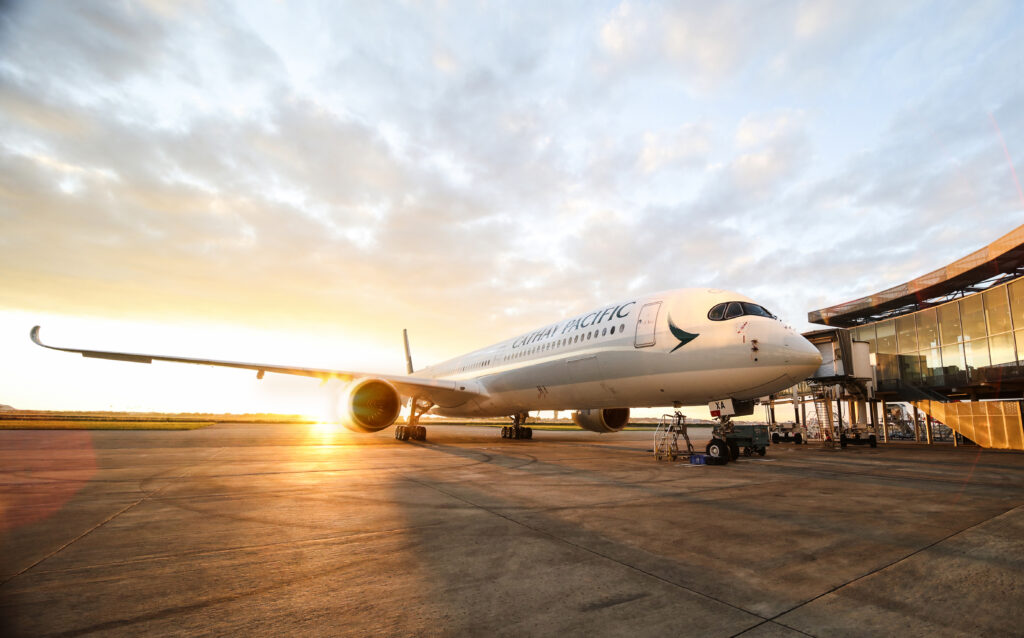Cathay Pacific has teamed up with the State Power Investment Corporation (SPIC) to drive the further development of the Sustainable Aviation Fuel (SAF) supply chain in China.
SPIC is one of the largest state-owned energy companies in the Chinese Mainland and a company with the world’s largest solar power installed capacity.
SPIC and Cathay Pacific have recently signed a Memorandum of Understanding (MoU) covering four SAF plants under SPIC.
The MoU was signed by SPIC International Finance (HK) Co. Ltd. Chairman Yin Guoping and Cathay Pacific General Manager Corporate Affairs Andy Wong at Cathay Pacific’s Hong Kong headquarters.

SPIC Chairman Qian Zhimin said: “The signing of our cooperation pact is an important milestone in SPIC’s sustainable development pursuits, and a significant contribution by a Chinese enterprise towards supporting sustainable development in the global aviation sector.”
“We hope both parties can build on our collaboration in the certification and purchase of SAF to further cooperate in areas pertaining to the industry supply chain, project development and securing the necessary policy support.”
[monsterinsights_popular_posts_inline]
Cathay Pacific Group CEO Ronald Lam said: “We are very excited to be partnering with SPIC to support and accelerate the development of the SAF industry in China.”
“Cathay Pacific has a target of using SAF for 10% of its total fuel consumption by 2030, which is a core component towards reaching our goal of net-zero carbon emissions by 2050.”
“This collaboration brings together the complementary advantages of SPIC’s strengths in the field of clean energy with Cathay Pacific’s expertise as an end-user of SAF. We hope this partnership will play an important role in the decarbonisation of the aviation industry.”
“Under the MoU, Cathay Pacific will share international experience, and also feedback on the SAF certification process, value chain and overall market know-how to facilitate SPIC in the successful establishment of four SAF plants in the Chinese Mainland.”
Commissioning in 2024 – 2026
The four SAF plants are expected to be commissioned between 2024 and 2026, and each will have the capacity to produce 50,000 to 100,000 tonnes of SAF annually. The plants will use a pathway similar to “Power-to-Liquids” (PtL) to generate the SAF, converting renewable electricity into liquid fuels.
Cathay Pacific is committed to pioneering the aviation industry’s move towards more substantial use of SAF, especially in Asia.
In 2014, it was the first airline investor in Fulcrum BioEnergy, from which the airline has already committed to purchasing 1.1 million tonnes of SAF over 10 years, which covers around 2% of its pre-COVID-19 fuel requirements on an annual basis.
SAF programme initiative
The airline also launched the Cathay Pacific Corporate SAF Programme – the first major programme of its kind in Asia – in 2022.
The programme provides corporate customers the opportunity to reduce their carbon footprint from business travel or airfreight by contributing to the use of SAF, which was uplifted and used at Hong Kong International Airport for the first time as part of the programme.
Cathay Pacific plans to scale up the programme in 2023, extending the service to more corporate customers.
Summary
Sustainable aviation fuel (SAF) development and uptake remains a cornerstone in the aviation sectors move towards net zero emissions.
The aviation industry is a significant contributor to global carbon dioxide emissions, accounting for around 2-3% of all anthropogenic emissions.
While the industry has made progress in improving fuel efficiency and reducing emissions, there is still a need for more sustainable alternatives to conventional jet fuel.
Many airlines and aircraft manufacturers have set targets to increase the use of SAF in their operations, as part of their commitment to reducing their carbon footprint.









